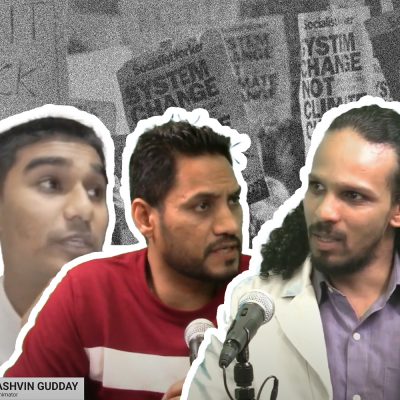Saturday 12 August marked the International Youth Day. Very often we refer to the youth as the future of tomorrow out, to bring the necessary changes, the youth must start to get in motion now in order to establish the right foundations for a Mauritius which promotes democracy, the good living together and also an inclusive and equity-based society.
To address this them, the “Ki nouvo moris” set had as guests Blackwell Louis and Teejvin Woodun. Both men recognized the importance of youth within a society. Young persons are aware of the political issues, and they can contribute to creating an alternative policy that takes into consideration the ecology, the rights of workers but also a parliament that truly represents a temple of democracy as well as institutions that operate freely.
Blackwell Louis started the debate by emphasizing that living in today’s society is no longer possible. He deplores that several young people have been in survival mode for many years because life as it was a decade ago is no longer the same. A loss of hope by the youth can be noted and it is really difficult for them to have clear vision of what awaits them in the future.
“Often we know what to do to bring about the necessary changes for a better future, the ideas are there, however we do not know how to achieve it.”
Do you think that the Mauritian educational system in Mauritius allows development?
Blackwell states that the education system in Mauritius is still quite good in comparison to others. There is a foundation, however it has not greatly evolved for more than 50 years. Indeed, this way of learning has been imposed on children and what is unfortunate is that it favors a specific system. Society has evolved on several levels whether from an economic point of view, science, medicine since the last 50 years but at the educational level, no change has really been made. The Mauritian educational system puts more emphasis on the purely traditional side which promotes rote learning and memorization instead of moving towards a holistic system which will bring a healthier environment where teacher will teach children how to learn instead of teaching them to recite.
It is true that in recent years there has been some change in what a person can do in terms of a career if they have not been able to pursue tertiary studies, however this is not enough. Education remains a class problem. Those who have more means will be able to access a better degree of education.
Teejvin Woodun for instance highlights that the educational world puts too much emphasis on competition instead on values such as solidarity or mutual aid among students.
“Students are more in this race to become laureates that they neglect socialization, leisure and other extracurricular activities such as music, arts and philosophy.”
In addition, parents do nothing to discourage this method of learning, which is not healthy, on the contrary they provide more private tuition to their children in order to be one step ahead of the others, which encourages an extreme competitive spirit.
What about the world of employment in Mauritius?
Many young people think that the work they do is not well paid, declares Blackwell Louis
“Whether you are a young graduate or you have years of experience in the filed in which you work, the salary that you receive is really low compared to what you should have received for all the task performed.”
Getting 14,000 or 15,000 rupees a month means nothing in the society we live in. With the high cost of living, this type of salary does not allow the development of an individual, on the contrary it generate more stress. There are still many youngsters who, despite their job, are forced to depend on their parents to make ends meet or to be able to afford the food necessary for survival.
What about brain drain?
Teejvin Woodun observes that more and more young people want to leave the country either for studies or simply to live abroad. This brain drain factor can be explained through multiple factors. Today, those who are economically stable and who come from wealthy families are moving towards abroad studies.
“We see that all the projects that this government has done, have not put emphasis on the education sector and especially tertiary education. Certain universities have become public and free, however the courses that are been offered are not innovative.”
In addition, we have a problem of lack of patriotism. Teejvin Woodun is of the opinion that love for the country should be taught and included in the Mauritian educational system. This apprenticeship must have been necessary since a very young age, and it begins by teaching children the true history of our country. By accepting our painful past and recognizing that Mauritius was built through a crime against humanity system such as slavery, patriotism can settle in the heart and daily life of every Mauritian. Indeed, those you want to leave Mauritius at all costs cannot be entirely blamed because they do not know how this country was formed, how out of love for the country several people have campaigned for structural and societal change.
“It’s unfortunate that students and youngsters do not know what happened in 1975 while the student uprising of May 20, 1975, was one of the key moments in the history of Mauritius. It’s not taught in schools because political leaders don’t want young people to realize the power they have in their hands if they decide to organize themselves and take action.”
Watch the debate here:


